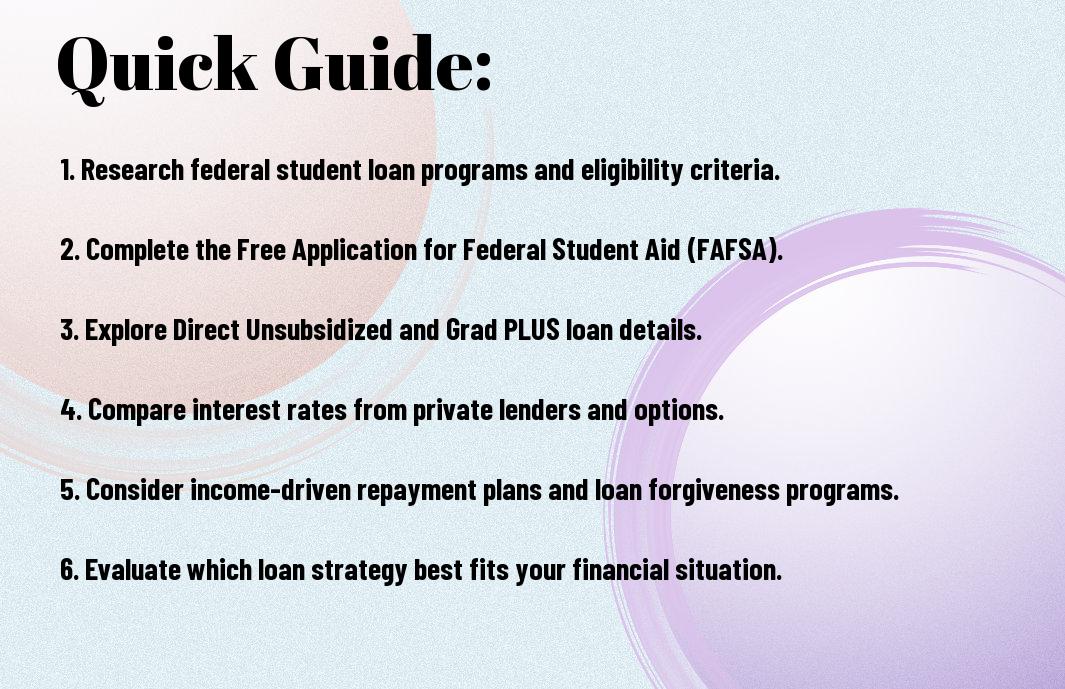A Dental Student’s Guide To Loan Options – From Federal Aid To Private Lenders
Most dental students find themselves navigating the complex world of financing their education, which can feel overwhelming. This guide will help you explore various loan options, from federal aid programs with lower interest rates to private lenders that may offer flexible terms. By understanding your financial options, you can make informed decisions that will positively impact your future and help you manage your student debt effectively. With the right knowledge at your fingertips, you’re one step closer to achieving your dental dreams without the burden of overwhelming financial strain.
Key Takeaways:
- Federal Aid: Understanding the types of federal loans available, such as Direct Unsubsidized Loans and Grad PLUS Loans, which offer lower interest rates and favorable repayment options.
- Interest Rates: Comparing interest rates between federal loans and private lenders to find the most cost-effective financing for dental education.
- Loan Forgiveness Programs: Exploring options like the Public Service Loan Forgiveness program that can significantly reduce the burden of student debt for those who commit to qualifying public service jobs.
- Private Lenders: Evaluating offers from private lenders, including interest rates, repayment terms, and additional benefits, as they might suit specific financial needs better than federal loans.
- Financial Planning: Emphasizing the importance of budgeting and financial forecasting to manage loan repayment effectively after graduation.
Understanding Loan Options
While navigating your dental education, understanding your loan options is vital. Different financial resources can help you fund your studies, each with its own advantages and distinct terms. By familiarizing yourself with the types of loans available, you can make informed decisions that suit your financial situation.
Types of Federal Aid
- Federal Direct Unsubsidized Loans
- Federal Direct Subsidized Loans
- Grad PLUS Loans
- National Health Service Corps (NHSC) Loan Repayment Program
- Perkins Loans
The options will vary in terms of interest rates, repayment periods, and eligibility requirements.
| Loan Type | Key Features |
| Federal Direct Unsubsidized Loans | Interest accumulates while in school |
| Federal Direct Subsidized Loans | Government pays interest while in school |
| Grad PLUS Loans | Cover costs exceeding other aid |
| NHSC Loan Repayment | For service in underserved areas |
| Perkins Loans | Limited availability, low-interest |
Private Lender Options
Even after exploring federal aid, many dental students consider private lender options for additional funding. Private loans can fill the financial gaps left by federal aid, but they often come with varying terms and conditions.
Understanding private loans is key to choosing the best one. They’ll typically have higher interest rates compared to federal loans and may involve credit checks to determine eligibility. You should also be aware that the repayment options can differ significantly; some lenders offer flexible repayment plans while others may not. Be cautious, as deferred payment options can lead to larger debt burdens when you begin repayment after graduation. Weighing your options carefully will ensure you’re not stuck with burdensome terms.

Step-by-Step Guide to Applying for Loans
Clearly, navigating the loan application process can be daunting, but breaking it down into manageable steps will make it easier for you. The following table outlines key steps to follow when applying for your loans:
| Step | Action |
| 1 | Assess your financial needs |
| 2 | Research federal and private loan options |
| 3 | Prepare your application documents |
| 4 | Complete your applications |
| 5 | Submit your loan applications |
Preparing Your Application
The loan application process requires thorough preparation. Gather all necessary documentation, including your financial aid history, transcripts, and any necessary identification. Ensure that your credit report is in order if applying for private loans, and have detailed information about your educational expenses ready.
Submitting Your Loan Applications
Even once your application is prepared, the submission process is critical. You need to accurately fill out every form and double-check each application to ensure that all information is correct.
StepbyStep, take your time to review all parts of your loan application before hitting submit. A small error can lead to a denied application or funding delays. Ensure your financial information is accurate and complete, and consider applying for multiple loans to increase your chances of receiving the funds you need. Finally, keep a record of your submissions and any confirmation emails, as following up might be needed in the future.

Key Factors to Consider
After exploring your financing options, you’ll need to consider several key factors before making a decision. Take the time to evaluate how these elements can impact your overall loan experience:
- Loan Amount
- Interest Rates
- Fees
- Repayment Terms
- Future Financial Flexibility
The right choices now can set you on a path to successful financial management during and after dental school.
Interest Rates and Fees
The interest rates and fees associated with a loan can significantly affect your overall debt. It’s crucial to compare fixed and variable rates, as well as any additional fees like origination fees or prepayment penalties. Lower rates and minimal fees can lead to substantial savings over the life of the loan, ensuring that your path to becoming a dentist is financially viable.
Repayment Terms and Conditions
Rates vary widely based on repayment terms and conditions, so it’s vital to choose a plan that aligns with your financial goals.
With various options available, understanding your repayment schedule, the duration of payments, and any deferment options is vital. You want to avoid terms that may lead to financial strain, so critically evaluate how long you’ll be paying back the loan. Choices such as income-driven repayment plans or loan forgiveness programs may provide positive flexibility during your dental career. Staying informed about these critical details will empower you to make the best decision.
Tips for Managing Student Debt
Many strategies can help you manage your student debt effectively. To stay on track, consider these tips:
- Create a monthly plan for your budget
- Make payments while in school, if possible
- Explore loan forgiveness options
- Stay informed on interest rates
- Consider refinancing after graduation
After implementing these techniques, you can take control of your financial future and lessen the burden of student loans.
Budgeting and Financial Planning
Student debt can feel overwhelming, but developing a solid financial plan is a powerful way to regain control. Begin by assessing your monthly expenses and identifying areas for potential savings. Establish an allowance for discretionary spending and set aside funds specifically for loan repayments. Utilizing budgeting tools and apps can assist in tracking your finances, ensuring you stay within your budget and make timely, effective payments towards your debt.
Resources for Loan Management
Debt management can be simplified by taking advantage of available resources. Many organizations and online platforms offer guidance for navigating student loans. Utilize tools such as budgeting calculators, repayment planners, and educational resources that help you understand the nuances of loan repayment.
Plus, you can find various non-profit credit counseling services that offer free advice and support in managing your loans. These resources can enhance your knowledge of debt management and provide personalized strategies tailored to your financial situation. Additionally, learn about income-driven repayment plans, which can make your payments more manageable based on your income level, ensuring you maintain a positive financial outlook while navigating your student debt.

Pros and Cons of Federal vs. Private Loans
Once again, you’ll need to evaluate the benefits and drawbacks of federal and private loans as you plan your education financing. Below is a helpful comparison to guide your decision-making:
| Pros of Federal Loans | Cons of Private Loans |
|---|---|
| Fixed interest rates | Variable interest rates may increase |
| No credit check required | Credit-based lending can limit options |
| Flexible repayment plans | Less flexible repayment terms |
| Loan forgiveness options | No forgiveness programs available |
| Deferment and forbearance options | Limited deferment options |
Advantages of Federal Aid
Little do many dental students realize, federal aid offers several advantages that can make a significant difference in your overall financial experience. The most notable benefits include fixed interest rates, repayment flexibility, and various forgiveness programs designed to lighten your debt load.
Disadvantages of Private Loans
Advantages can be overshadowed by certain downsides when it comes to private loans.
Plus, private loans often come with variable interest rates that can lead to increased payments over time. These loans may require a strong credit history, leaving students with limited options if their credit is less than stellar. Additionally, forgiveness options are nearly nonexistent, and repayment plans tend to be less flexible, which can place undue strain on your finances following graduation.
Loan Forgiveness Programs
Despite the daunting amount of student debt, various loan forgiveness programs can lessen your financial burden. These programs allow borrowers in specific fields, such as dentistry, to potentially have a portion of their loans canceled after meeting certain work commitments. By understanding the available options, you can strategically align your career choices to maximize these benefits and enjoy a greater sense of financial freedom in your professional journey.
Eligibility Criteria
You must meet specific requirements to qualify for loan forgiveness programs. These typically include working in a designated high-need area, committing to public service positions, or fulfilling other conditions set by the program. Each program may vary in its criteria, so it’s important to carefully evaluate your situation and the opportunities available.
Application Process
On applying for loan forgiveness programs, you must follow a structured procedure that typically involves submitting forms and documentation to verify your qualifying employment. This process may seem overwhelming, but staying organized can simplify it.
Process your application accurately by collecting the necessary employment verification letters, proper documentation, and any relevant personal identification. Additionally, ensure you adhere to deadlines and provide detailed information about your employment history. Keep copies of everything you submit, as they may be required for future reference. Thoroughness during this step is important; any mistakes could delay the approval of your forgiveness application significantly. Be proactive and stay informed regarding any updates from the program to ensure that you remain on track.
To wrap up
As a reminder, understanding the loan options available to you as a dental student is important for managing your educational expenses. From federal aid programs that offer competitive interest rates to private lenders that may provide additional funds, knowing your choices empowers you to make informed decisions. Ensure you thoroughly research each option, evaluate your financial situation, and choose the one that best fits your needs. With the right knowledge, you can confidently navigate your funding journey and focus on achieving your dental career goals.
FAQ
Q: What are the main types of loans available for dental students?
A: Dental students typically have access to two main types of loans: federal student loans and private student loans. Federal loans include Direct Subsidized and Unsubsidized Loans, Perkins Loans, and PLUS Loans. Private loans come from banks, credit unions, or other financial institutions and may have different terms and interest rates.
Q: How do federal student loans differ from private loans for dental students?
A: Federal student loans often offer benefits such as fixed interest rates, income-driven repayment plans, and deferment options that can make them more appealing compared to private loans. Private loans may have variable interest rates and less flexible repayment options. Additionally, federal loans do not require a credit check, while private lenders typically do.
Q: What should dental students consider when choosing between federal and private loans?
A: It’s important for dental students to evaluate the interest rates, repayment options, and additional benefits each loan type offers. Additionally, they should consider their financial situation, including future income potential and whether they plan to pursue any federal loan forgiveness programs, which are not available for private loan holders.
Q: Are there specific loan options available for dental students that offer lower interest rates?
A: Yes, some loan programs specifically designed for dental students may offer competitive interest rates or special repayment options. Dental students can research institutional loans offered by their schools or state loan programs, which sometimes have better rates compared to commercial loans.
Q: How can dental students improve their chances of getting approved for private loans?
A: To enhance approval odds for private loans, dental students should maintain a good credit score, have a decent debt-to-income ratio, and consider applying with a co-signer who has a stronger credit history. Some lenders also assess the applicant’s academic performance, so good grades may help as well.
Q: Can dental students refinance their loans after graduation?
A: Yes, dental students can refinance their loans after graduation. This process allows them to combine multiple loans into one, often with the potential for a lower interest rate or improved repayment terms. However, they should be cautious, as refinancing federal loans into private loans eliminates certain federal protections and benefits.
Q: Where can dental students find additional information and resources on loan options?
A: Dental students can consult their school’s financial aid office for personalized advice on loan options. Additionally, reputable websites such as the Federal Student Aid website and financial literacy resources can provide valuable information on navigating loans, budgeting, and repayment strategies.






